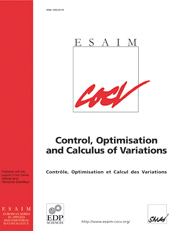Article contents
Optimal control of the Primitive Equations of the ocean with Lagrangian observations
Published online by Cambridge University Press: 21 April 2009
Abstract
We consider an optimal control problem for the three-dimensional non-linear Primitive Equations of the ocean in a vertically bounded and horizontally periodic domain. We aim to reconstruct the initial state of the ocean from Lagrangian observations. This inverse problem is formulated as an optimal control problem which consists in minimizing a cost function representing the least square error between Lagrangian observations and their model counterpart, plus a regularization term. This paper proves the existence of an optimal control for the regularized problem. To this end, we also prove new energy estimates for the Primitive Equations, thanks to well-chosen functional spaces, which distinguish the vertical dimension from the horizontal ones. We illustrate the result with a numerical experiment.
- Type
- Research Article
- Information
- ESAIM: Control, Optimisation and Calculus of Variations , Volume 16 , Issue 2 , April 2010 , pp. 400 - 419
- Copyright
- © EDP Sciences, SMAI, 2009
References
- 1
- Cited by


